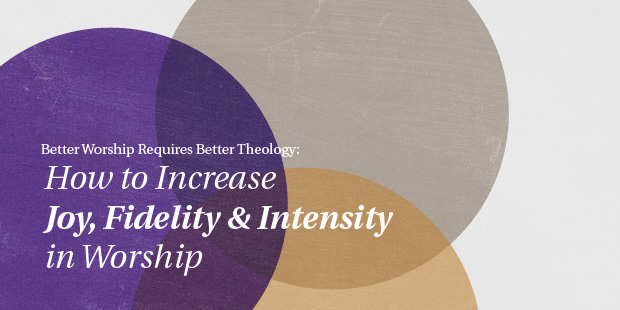
Better Worship Requires Better Theology: How to Increase Joy, Fidelity, and Intensity in Worship
“How do I help people engage in worship?”
I know of few church leaders for whom this isn’t a concern on some level. Whether we’re small group leaders, playing in the praise band or the senior leaders, we all want to see the men and women in our churches increasingly engaged in worship (in every sense of the word).
So… how do we do that?
Is it through turning up the speakers? Singing songs with lots of participation, clapping and suggested actions in the lyrics?
D.A. Carson offers a pretty different suggestion in his recently released book, Jesus the Son of God: A Christological Title Often Overlooked, Sometimes Misunderstood, and Currently Disputed:
We increase the intensity, joy, and fidelity of our worship, not by including the verb “to worship” in every second line in our so-called “worship songs,” but by knowing more about God, and bringing our adoration to him, as he is.
Insofar as our conceptions of him diverge from what he has disclosed of himself, so far are we worshiping a false god, which is normally called idolatry. To study hard what holy Scripture says about the Son of God, who has most comprehensively revealed his heavenly Father, is to know more about God, and thus to begin to ground our worship in reality rather than slogans. (Kindle location 1204)
Carson’s point is simple: better worship requires better theology.
It seems counterintuitive. Indeed, some have suggested it’s simplicity, rather than complexity, that increases the intensity of worship. You often see this argument used in connection with battles over hymns in modern worship services.
The language is unfamiliar (unless the lyrics have been updated) and the theology expressed is too complex for the average Christian, or so go some arguments (never mind that the audience for many of the hymns we still widely sing today was illiterate farmers).
True, many (but certainly not all) of the hymns are anything but simple. But, then, neither are many of the preeminent examples of songs of worship found in the Psalms and throughout the rest of Scripture. They communicate profoundly deep—and often complex—truths about God.
At the risk of overstating, I would suggest the objection many have today about complexity in worship is not because “simple” is better. It’s that we are too ill-equipped to handle much more than the most basic truths of Scripture.
While we must always be careful that we don’t succumb to sinful intellectual elitism, we can’t ignore the way God appears to have wired the Christian faith—increased knowledge and understanding of God leads to increased worship.
Depth begets awe.
This is (at least in part) the desire that is to fuel our disciple-making, as Paul’s prayer for the Colossians makes clear. Maybe it should be our prayer, too:
And so, from the day we heard, we have not ceased to pray for you, asking that you may be filled with the knowledge of his will in all spiritual wisdom and understanding, so as to walk in a manner worthy of the Lord, fully pleasing to him, bearing fruit in every good work and increasing in the knowledge of God. May you be strengthened with all power, according to his glorious might, for all endurance and patience with joy, giving thanks to the Father, who has qualified you to share inthe inheritance of the saints in light. (Col 1:9-12)

Tags: Aaron Armstrong, Scripture, Theology, Worship












